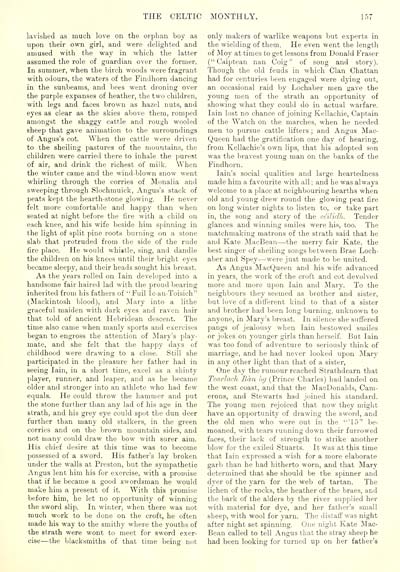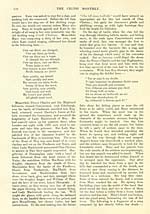Blair Collection > Celtic monthly > Volume 6, 1898
(225)
Download files
Complete book:
Individual page:
Thumbnail gallery: Grid view | List view

THE CELTIC MONTHLY.
157
lavished as much love on the orphan boy as
upon their ovm girl, and were delighted and
amused with the way in which the latter
assumed the role of guardian over the former.
In summer, when the birch woods were fragrant
with odours, the waters of the Findhorn dancing
in the sunbeams, and bees went droning over
the purple expanses of heather, the two children,
with legs and faces brown as hazel nuts, and
eyes as clear as the skies above them, romped
amongst the shaggy cattle and rough wooled
sheep that gave animation to the surroundings
of Angus's cot. When the cattle were driven
to the shelling pastures of the mountains, the
children were carried there to inhale the purest
of air, and drink the richest of miik. When
the winter came and the wind-blown snow went
whirling through the corries of Monalia and
sweeping through Slochmuick, Angus's stack of
peats kept the hearth-.stone glowing. He never
felt more comfortable and liappy than when
seated at night before the tire with a child on
each knee, and his wife beside hiui spinning in
the light of split pine roots burning on a stone
slab that ])rotruded from the side of the rude
fire place. He would whistle, sing, and dandle
the children on his knees until their bright eyes
became sleepy, and their heads sought his breast.
As the years rolled on Iain developed into a
handsome fair haired lad with the proud bearing
inherited from his fathers of "Fuil Ic-an-Toisich"
(Mackintosh blood), and Mary into a lithe
graceful maiden with dark eyes and raven hair
that told of ancient Hebridean descent. The
time also came when manly sports and e.x.ercises
began to engross the attention of ^Mary's play-
mate, and she felt that the happy days of
childhood were drawing to a close. Still she
participated in the pleasure her father had in
seeing Iain, in a short time, excel as a shinty
player, runner, and leaper, and as he became
older and stronger into an athlete who had few
equals. He could throw the hammer and put
the stone further than any lad of his age in the
strath, and his grey eye could spot the dun deer
further than many old stalkers, in the green
corries and on the brown mountain sides, and
not many could draw the bow with surer aim.
His chief desire at this time was to become
possessed of a sword. His father's lay broken
under the walls at Preston, but the sympathetic
Angus lent him his for exercise, with a promise
that if he became a good swordsman he would
make him a present of it. With this promise
before him, he let no opportunity of winning
the sword slip. In winter, when there was not
much work to be done on the croft, he often
made his way to the smithy where the youths of
the strath were wont to meet for sword exer-
cise — the blacksmiths of that time being not
only makers of warlike weapons but experts in
the wielding of them. He even went the length
of JNIoy at times to get lessons from Donald Eraser
(" Caiptean nan Coig " of song and story).
Though the old feuds in which Clan Chattan
had for centuries been engaged were dying out,
an occasional raid by Lochaber men gave the
young men of the strath an opportunity of
showing what they could do in actual warfare.
Iain lost no chance of joining Kellachie, Captain
of the Watch on the marches, when he needed
men to pursue cattle lifters; and Angus Mac-
Queen had the gratification one day of hearing,
from Ivellachie's own lips, that his adopted son
was the bravest young man on the banks of the
Findhorn.
Iain's social qualities and large heartedness
made him a favourite with all ; and he was always
welcome to a place at neighbouring hearths when
old and young drew round the glowing peat fire
on long w-inter nights to listen to, or take part
in, the song and story of the cciluUi. Tender
glances and winning smiles were his, too. The
matchmaking matrons of the strath said that he
and Kate MacBean — the merry fair Kate, the
best singer of shelling songs between Brae Loch-
aber and Spey — were just made to be united.
As Angus MacQueen and his wife advanced
in years, the work of the croft and cot devolved
more and more upon Iain and Mary. To the
neighbours they seemed as brother and sister,
but love of a ditlerent kind to that of a sister
and brother had been long burning, unknown to
anyone, in Mary's breast. In silence she suffered
pangs of jealou.sy when Iain bestowed smiles
or jokes on younger girls than herself. But Iain
was too fond of adventure to seriously think of
marriage, and he had never looked upon Mary
in any other light than that of a sister.
One day the rumour reached Strathdearn that
Tearlacli Ban bg (Prince Charles) had landed on
the west coast, and that the MaoDonalds, Cam-
erons, and Stewarts had joined his standard.
The young men rejoiced that now they might
have an opportunity of drawing the sword, and
the old men who were out in the '"15" be-
moaned, with tears running down their furrowed
faces, their lack of strength to strike another
blow for the exiled Stuarts. It was at this time
that Iain expressed a wish for a more elaborate
garb than he had hitherto worn, and that Mary
determined that she should be the spinner and
dyer of the yarn for the web of tartan. The
lichen of the rocks, the heather of the braes, and
the bark of the alders by the river supplied her
with material for dve, and her father's small
sheep, with wool for yarn. The distaff was night
after night set spinning. One night Kate Mac-
Bean called to tell Angus that the stray sheep he
had been looking for turned up on her father's
157
lavished as much love on the orphan boy as
upon their ovm girl, and were delighted and
amused with the way in which the latter
assumed the role of guardian over the former.
In summer, when the birch woods were fragrant
with odours, the waters of the Findhorn dancing
in the sunbeams, and bees went droning over
the purple expanses of heather, the two children,
with legs and faces brown as hazel nuts, and
eyes as clear as the skies above them, romped
amongst the shaggy cattle and rough wooled
sheep that gave animation to the surroundings
of Angus's cot. When the cattle were driven
to the shelling pastures of the mountains, the
children were carried there to inhale the purest
of air, and drink the richest of miik. When
the winter came and the wind-blown snow went
whirling through the corries of Monalia and
sweeping through Slochmuick, Angus's stack of
peats kept the hearth-.stone glowing. He never
felt more comfortable and liappy than when
seated at night before the tire with a child on
each knee, and his wife beside hiui spinning in
the light of split pine roots burning on a stone
slab that ])rotruded from the side of the rude
fire place. He would whistle, sing, and dandle
the children on his knees until their bright eyes
became sleepy, and their heads sought his breast.
As the years rolled on Iain developed into a
handsome fair haired lad with the proud bearing
inherited from his fathers of "Fuil Ic-an-Toisich"
(Mackintosh blood), and Mary into a lithe
graceful maiden with dark eyes and raven hair
that told of ancient Hebridean descent. The
time also came when manly sports and e.x.ercises
began to engross the attention of ^Mary's play-
mate, and she felt that the happy days of
childhood were drawing to a close. Still she
participated in the pleasure her father had in
seeing Iain, in a short time, excel as a shinty
player, runner, and leaper, and as he became
older and stronger into an athlete who had few
equals. He could throw the hammer and put
the stone further than any lad of his age in the
strath, and his grey eye could spot the dun deer
further than many old stalkers, in the green
corries and on the brown mountain sides, and
not many could draw the bow with surer aim.
His chief desire at this time was to become
possessed of a sword. His father's lay broken
under the walls at Preston, but the sympathetic
Angus lent him his for exercise, with a promise
that if he became a good swordsman he would
make him a present of it. With this promise
before him, he let no opportunity of winning
the sword slip. In winter, when there was not
much work to be done on the croft, he often
made his way to the smithy where the youths of
the strath were wont to meet for sword exer-
cise — the blacksmiths of that time being not
only makers of warlike weapons but experts in
the wielding of them. He even went the length
of JNIoy at times to get lessons from Donald Eraser
(" Caiptean nan Coig " of song and story).
Though the old feuds in which Clan Chattan
had for centuries been engaged were dying out,
an occasional raid by Lochaber men gave the
young men of the strath an opportunity of
showing what they could do in actual warfare.
Iain lost no chance of joining Kellachie, Captain
of the Watch on the marches, when he needed
men to pursue cattle lifters; and Angus Mac-
Queen had the gratification one day of hearing,
from Ivellachie's own lips, that his adopted son
was the bravest young man on the banks of the
Findhorn.
Iain's social qualities and large heartedness
made him a favourite with all ; and he was always
welcome to a place at neighbouring hearths when
old and young drew round the glowing peat fire
on long w-inter nights to listen to, or take part
in, the song and story of the cciluUi. Tender
glances and winning smiles were his, too. The
matchmaking matrons of the strath said that he
and Kate MacBean — the merry fair Kate, the
best singer of shelling songs between Brae Loch-
aber and Spey — were just made to be united.
As Angus MacQueen and his wife advanced
in years, the work of the croft and cot devolved
more and more upon Iain and Mary. To the
neighbours they seemed as brother and sister,
but love of a ditlerent kind to that of a sister
and brother had been long burning, unknown to
anyone, in Mary's breast. In silence she suffered
pangs of jealou.sy when Iain bestowed smiles
or jokes on younger girls than herself. But Iain
was too fond of adventure to seriously think of
marriage, and he had never looked upon Mary
in any other light than that of a sister.
One day the rumour reached Strathdearn that
Tearlacli Ban bg (Prince Charles) had landed on
the west coast, and that the MaoDonalds, Cam-
erons, and Stewarts had joined his standard.
The young men rejoiced that now they might
have an opportunity of drawing the sword, and
the old men who were out in the '"15" be-
moaned, with tears running down their furrowed
faces, their lack of strength to strike another
blow for the exiled Stuarts. It was at this time
that Iain expressed a wish for a more elaborate
garb than he had hitherto worn, and that Mary
determined that she should be the spinner and
dyer of the yarn for the web of tartan. The
lichen of the rocks, the heather of the braes, and
the bark of the alders by the river supplied her
with material for dve, and her father's small
sheep, with wool for yarn. The distaff was night
after night set spinning. One night Kate Mac-
Bean called to tell Angus that the stray sheep he
had been looking for turned up on her father's
Set display mode to: Large image | Transcription
Images and transcriptions on this page, including medium image downloads, may be used under the Creative Commons Attribution 4.0 International Licence unless otherwise stated. ![]()
| Early Gaelic Book Collections > Blair Collection > Celtic monthly > Volume 6, 1898 > (225) |
|---|
| Permanent URL | https://digital.nls.uk/75857258 |
|---|
| Shelfmark | Blair.58 |
|---|---|
| Additional NLS resources: | |
| Attribution and copyright: |
|
| Description | A selection of books from a collection of more than 500 titles, mostly on religious and literary topics. Also includes some material dealing with other Celtic languages and societies. Collection created towards the end of the 19th century by Lady Evelyn Stewart Murray. |
|---|
| Description | Selected items from five 'Special and Named Printed Collections'. Includes books in Gaelic and other Celtic languages, works about the Gaels, their languages, literature, culture and history. |
|---|

